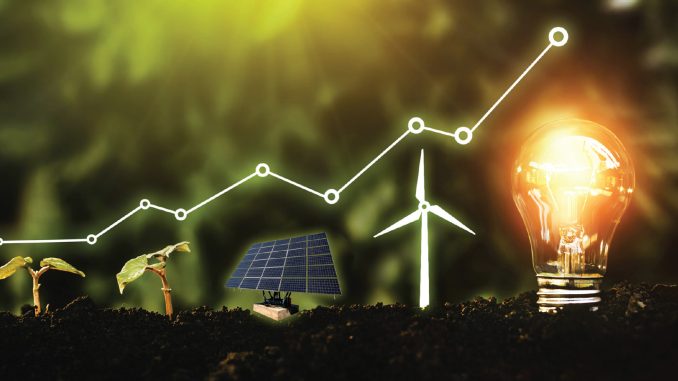
In 2021, India has seen considerable financial activity in the green energy sector, both on the equity as well as debt fronts. While there was growth in debt financings, the financial activity was largely concentrated in the equity segment. The sector also saw an influx of foreign investment during the year. However, in a major development, SB Energy exited the Indian market, selling its entire stake to Adani Green Energy Limited (AGEL). The green bond market also saw an upward movement with companies such as ReNew Power, ACME, Azure and Adani issuing green bonds. Infrastructure investment trusts (InvITs) was another emerging area in green finance, although it is still at a nascent stage.
Renewable Watch highlights the major debt and equity deals in the industry over the past 12 months…
Equity deals
The equity financing front has witnessed more developments compared to debt financing between December 2020 and November 2021. Apart from key renewable energy developers, industry giants Adani and Reliance accelerated their financial activities in the renewable energy space. Given their access to finance, the companies could grow their renewable portfolio significantly through the acquisition route.
We tracked 21 equity deals during the year, of which the biggest was AGEL’s acquisition of SB Energy for $3.5 billion.
- In December 2020, Orient Cement, a subsidiary of the CK Birla Group, announced that it would acquire a 26 per cent stake in AMPSolar Systems. As per the agreement, Orient entered into a share purchase, subscription and shareholders agreement with AMPSolar Technology Private Limited and AMPSolar Systems Private Limited.
- In December 2020, Ayana Renewable Power Private Limited raised $390 million in equity funding from its key backers. The biggest contributor was the National Investment and Infrastructure Fund (NIIF), which invested $284 million. The investment comes from NIIF’s master fund, and it will now be a majority stakeholder in Ayana. The other investors included the CDC Group and EverSource Capital, which invested $70 million and $36 million respectively.
- In January 2021, Bharat Forge, a Pune-based multinational infrastructure company, made an equity investment of Rs 28.7 million in Avaada Renewable’s special purpose vehicle (SPV) Avaada SataraMH.
- In February 2021, Solavio Labs, an Indian start-up that develops robotic technologies to clean solar panels, announced that it raised Rs 4 million in funding from a Canadian innovation fund.
- In March 2021, the Orix Corporation reported the completion of acquisition of a 21.8 per cent stake in Greenko Energy Holdings for about $961 million. Orix will add 873 MW of its wind energy portfolio in India into Greenko’s portfolio in exchange for the shares.
- In April 2021, Freyr Energy announced an equity investment of Rs 180 million from Total Carbon Neutrality Ventures, Schneider Electric Energy Access Asia and Capital 4 Development Partners.
- In May 2021, AGEL signed a share purchase agreement to acquire 100 per cent stake in SB Energy India from the SoftBank Group and the Bharti Group. The transaction marks the largest acquisition in the renewable energy sector in India, at an enterprise valuation of about $3.5 billion. SB Energy India had a total renewable energy portfolio of 4,954 MW spread across four states in India.
- In June 2021, Fortum decided to divest 500 MW of solar projects in India and signed an agreement with global infrastructure investment firm Actis for the same. As part of the agreement, Actis will receive ownership of the 250 MW Pavagada II solar plant in Karnataka and 250 MW of solar power plants in Rajasthan. The total consideration from the divestment is expected to be approximately Euro 280 million on a debt and cash-free basis.
- In July 2021, Fourth Partner Energy raised $125 million in equity funding from Norfund, the Norwegian Investment Fund, and existing shareholder, The RISE Fund (TPG). Norfund invested $100 million while TPG invested $25 million.
- In July 2021, IndiGrid announced the acquisition of 100 per cent stake in two solar assets with a cumulative capacity of 100 MW from Madrid-based developer Fotowatio Renewable Ventures at an enterprise value of Rs 6.6 billion.
- In July 2021, Fourth Partner Energy acquired a solar portfolio of 8.9 MW, consisting of distributed solar projects, from Statkraft India.
- In August 2021, Copenhagen Infrastructure Partners (CIP), a renewable energy-focused fund manager, committed a $100 million investment with Amp Energy India Private Limited, to enhance its renewable energy portfolio in India.
- In August 2021, Augment Infrastructure, a US-based investment firm, announced an equity investment of $222.23 million to acquire a majority stake in CleanMax.
- In August 2021, Torrent Power Limited announced the acquisition of 100 per cent of the share capital and all securities of LREHL Renewables India SPV 1 Private Limited from Lightsource India Limited and Lightsource Renewable Energy (India) Limited.
- In September 2021, Torrent Power Limited entered into a share purchase agreement with CESC Limited, Haldia Energy Limited and other nominal shareholders to acquire 100 per cent of the share capital of Surya Vidyut Limited, a wholly owned subsidiary of CESC Limited.
- In October 2021, Reliance New Energy Solar Limited (RNESL) announced the acquisition of 100 per cent stake of REC Solar Holdings from China National Bluestar. The enterprise value for the acquisition was $771 million.
- In the same month, RNESL agreed to purchase a 40 per cent share in Sterling & Wilson Solar from Shapoorji Pallonji and Company Private Limited (SPCPL) through a combination of primary investment, secondary purchase and an open offer for around Rs 28 billion.
- Jubilant Ingrevia plans to acquire a 26.6 per cent stake in AMP Energy Green Fifteen for Rs 511 million for setting up a solar power plant with capacity of 15.5 MW under the captive scheme.

Debt deals
Even though there has been a decline in debt financing over the past few years, a significant number of deals took place in the past 12 months.
- In January 2021, the CDC Group announced a $30 million credit facility to Tata Cleantech Capital Limited (TCCL). The deal marks the first green loan facility offered by the CDC Group. The investment will allow TCCL to provide loans to businesses across the country with a focus on e-mobility solutions, water and energy efficiency.
- In March 2021, AGEL raised a $1.35 billion debt package for its renewable asset portfolio, which is currently under construction. Further, the company has signed definitive agreements with international lenders. The funding will be utilised to finance 1.69 GW of solar-wind hybrid projects currently being developed in Rajasthan. As per the agreement, 12 international banks will participate in the facility.
- In March 2021, the Japan International Cooperation Agency (JICA) signed a loan agreement with TCCL, an Indian non-banking financial company. The financing for a maximum amount of JPY 10 billion will help support TCCL to offer loans to businesses across India that focus on renewable energy generation.
- In April 2021, Fourth Partner Energy received a funding of Rs 2.5 billion from the CDC Group in the form of non-convertible debentures. This is CDC’s first investment in the commercial and industrial solar segment in India.
- In May 2021, SHV Energy, a Dutch multinational distributor of LPG, acquired a majority stake in SunSource Energy. With this investment, SunSource plans to increase its solar portfolio to over 550 MWp by 2023.
- In July 2021, Azure Power signed a five-year syndicated financing deal of $163 million with the Mitsubishi UFJ Financial Group (MUFG) for its 300 MW solar project, which is currently being developed in Rajasthan. For the transaction, MUFG acted as a lead manager, a hedging bank, a facility agent and a bank issuing line of credit.
- In July 2021, the Asian Infrastructure Investment Bank (AIIB) approved a $50 million loan facility to Italy-based Enel Green Power to develop a 300 MW solar project in Rajasthan.
- In July 2021, MYSUN raised Rs 150 million from TCCL in debt funding. The loan will be used to fund the existing projects of MYSUN+, while the credit line will be pumped into building the projects in the pipeline.
- In September 2021, NTPC Renewable Energy Limited (NTPC REL), a fully owned subsidiary of state-owned power generator NTPC, signed its first green term loan agreement for Rs 5 billion. As per the company statement, the loan agreement was signed at a competitive rate with a tenor of 15 years with the Bank of India.
- In October 2021, Vector Green Energy, a Mumbai-based independent power producer focused on solar and wind energy, received a loan of Rs 11 billion from the Indian Renewable Energy Development Agency (IREDA).
- In October 2021, the Green Growth Equity Fund, India’s climate change fund, received a $70 million investment from the CDC Group. Eversource Capital, a joint venture between private equity firm Everstone Group and British Petroleum’s renewable energy platform LightSource bp, manages the fund.

Green bonds and InvITs
The current year has seen increased activity in India’s green bond market. In 2021, Indian renewable energy developers raised more capital in the international bond market than in any preceding year. While in the past green bonds have been issued by big developers such as Greenko, RenNew Power, Azure Power and AGEL, this year witnessed first time green bond issuances from players like Hero Future Energies (HFE), JSW Hydro and ACME Solar.
In March 2021, HFE, the renewable energy arm of the Hero Group, received orders worth $3 billion for its first green bond issuance in the overseas markets. In May 2021, JSW Hydro Energy raised $707 million through green bonds. The bonds were issued by JSW to repay the existing debt on its two operational hydro projects. In July 2021, ACME Solar raised $334 million in debt investment through the issuance of offshore green bonds. In the same month, Adani Electricity Mumbai Limited raised $300 million through green bonds as part of its $2 billion global medium-term note programme. The bonds also generated massive global interest and were oversubscribed by 9.2 times. Later in the year, Adani Green Energy Limited issued its first ListCo senior green bond, raising $750 million. The bonds will have a three-year tenor at a rate of 4.375 per cent, with the funds being used to finance renewable energy currently under development by AGEL.
In August 2021, Azure Power also announced a green bond issuance of $414 million. IREDA, which is a key entity in the Indian renewable energy finance space, has announced its plans to launch an initial public offering of new equity shares and issue green bonds in both domestic and international markets to mobilise capital for lending.
In addition to green bonds, other sources of finance for renewable energy have emerged. Notable among them are InvITs, wherein investors are called upon to invest in a new asset class that would provide them a yield over a long-term period, typically over the life cycle of the project. These have gained traction in the renewable energy market and can help address some of the concerns related to long-term finance. In November 2021, Virescent Renewable Energy Trust, backed by KKR-sponsored Virescent Infrastructure, raised Rs 10 billion through non-convertible debentures in its debut issuance, which was split into three tranches of three, five and seven years. This is the first time a renewable energy InvIT has issued securities in India.

Outlook
The inflow of finance into the renewable sector has been on the rise, especially in light of the targets announced – the shorter-term target of 175 GW for 2022 and the longer-term target of 500 GW by 2030. There has also been an increase in foreign funding, which can be expected to grow further following the dialogue at COP26, where India reinstated its focus on developing renewable energy. Recently, domestic and global giants have been acquiring large portfolios of renewable energy assets, and even merging their operations with renewable energy companies to tap into the Indian market.
The investments in renewable energy will most likely be led by big players, which have plans to establish themselves in this space. These include large groups such as Adani and Reliance, which have ambitious plans for renewable expansion. Reliance has announced plans to invest Rs 750 billion in green energy initiatives over the next three years. Of the total investment planned, Rs 600 billion will be invested to create a fully integrated, end-to-end renewable energy ecosystem. Meanwhile, the Adani Group plans to invest over $20 billion in renewable energy generation and $50 billion and $70 billion in overall organic and inorganic investment respectively across the green energy chain.
Going forward, more financial flows can be expected, especially on the equity front. India’s renewable energy M&A landscape will continue to expand, given the fast-growing renewable energy market and the increasing energy demand. However, due to extensive due diligence, third-party consent and complexity in M&A deals, equity and debt financing continue to dominate as the preferred sources of finance for renewable energy companies in India. Further, owing to the success of the initial few green bond issuances, the popularity of raising funds through international green bonds is expected to expand.



